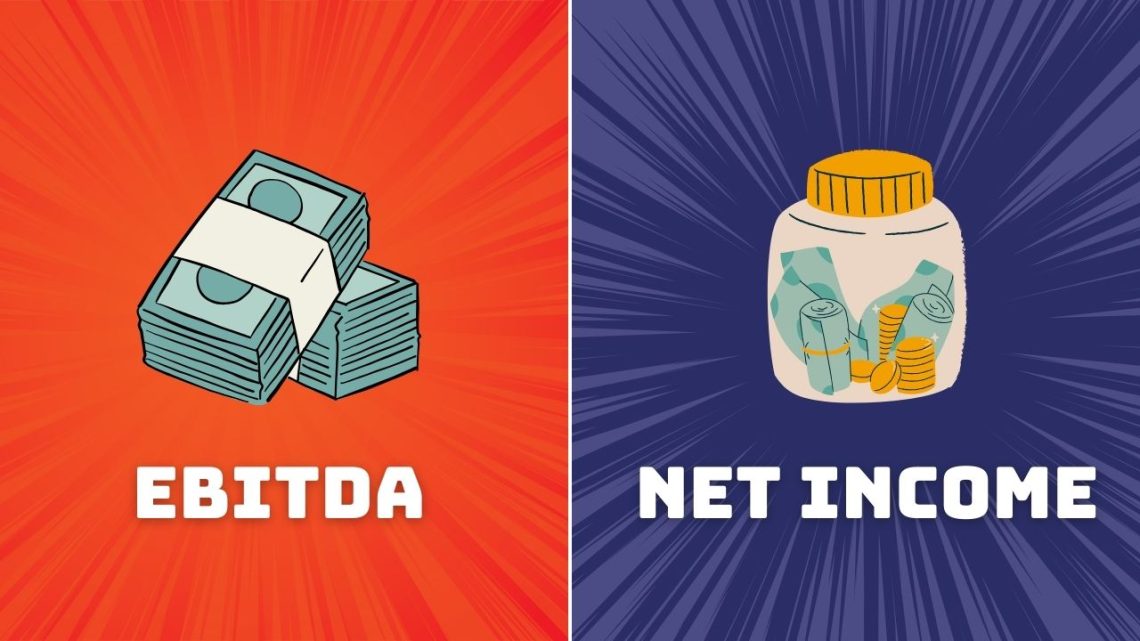Whether you are an entrepreneur or an investor, you need to know the numbers to evaluate the business’s financial health. There are two figures that might confuse you at first: EBITDA and Net Income. Each figure shows a different side of a company’s financial image.
While EBITDA reveals a company’s revenue, Net Income captures the business’s profit.
But wait! we will explain iwith examples, so that you’ll know exactly how to use them to make smarter decisions for your business or the business you are going to buy.
What is EBITDA?
EBITDA stands for Earnings Before Interest, Taxes, Depreciation, and Amortization. It is a metric that tells us how much cash a business generates from its everyday operations.
Now, imagine removing expenses that don’t directly relate to a company’s day-to-day operations, like interest on loans and taxes. What’s left presents a clearer picture of the company’s operating performance. That’s EBITDA.
Some investors love using this metric because it’s like peeking into a company’s “true” operational cash flow. It presents a more direct view of cash flow without getting into the business’ liabilities and other financial burdens.
Understanding the Components of EBITDA
To better understand EBITDA, let’s break down its different components:
- Earnings: This is the total amount the company earns from sales of products and services, minus the cost of goods sold (raw materials, inventory, wages) and overhead costs like storefront rent or web hosting services in case of an online business.
- Before Interest: Excludes the amount paid to lenders.
- Taxes: Ignores taxes.
- Depreciation & Amortization: Leaves out costs tied to wear and tear on tangible assets (depreciation) or intangible assets (amortization). This is more of an financial entry for maintaining the records.
Each of these adjustments helps us focus on the company’s core, operational cash-generating power.
How is EBITDA Calculated?
To calculate a company’s EBITDA, start by finding the Net Income, then add back interest, taxes, depreciation, and amortization. The formula is:
EBITDA = Net Income + Interest + Taxes + Depreciation + Amortization
For instance, if a company’s books show:
- Net Income: $100,000
- Interest Expense: $20,000
- Taxes: $15,000
- Depreciation: $10,000
- Amortization: $5,000
Using our formula, we’d get:
EBITDA = 100,000 + 20,000 + 15,000 + 10,000 + 5,000 = 150,000
So, the company’s EBITDA is $150,000.
Get the best price for your business — we take care of the rest.
Start Selling for FreeWhat is Net Income?
Net Income is the real profit a company takes home after covering all its expenses. That’s why it is called the “bottom line”.
After accounting for operating costs, interest, taxes, and depreciation, we’re left with Net Income. It’s like checking your bank balance after all bills are paid, showing how much you’re left with.
Net Income is often the go-to metric for profitability since it reflects the true earnings of a company, giving investors a solid picture of whether or not the business is profitable.
It is also an GAAP metric, meaning it is required in financial reporting.
How Net Income is Calculated
To find Net Income, subtract all expenses from total revenue. Here’s the formula:
Net Income = Total Revenue − (Operating Expenses + Interest + Taxes + Depreciation + Amortization)
For example, if a company has:
- Total Revenue: $200,000
- Operating Expenses: $120,000
- Interest Expense: $15,000
- Taxes: $20,000
- Depreciation: $5,000
- Amortization: $3,000
Using our formula, Net Income would be:
Net Income = 200,000 − (120,000 + 15,000 + 20,000 + 5,000 + 3,000) = 37,000
So, the company’s Net Income is $37,000. This figure reflects the company’s profit after all expenses, presenting a complete picture of its financial health.
Receive an instant valuation with our Ecommerce Business Valuation Tool.
Get My ValuationKey Differences Between EBITDA and Net Income
Each metric has its place, and which one to use depends on what you’re trying to understand about the business. Here’s an overview of how they differ:
| EBITDA | Net Income | |
|---|---|---|
| Meaning | Earnings, before Interest, Taxes, Depreciation, and Amortization | Total profit after all expenses, including interest, taxes and depreciation |
| Purpose | Focuses on operational cash flow potential | Reflect overall profitability |
| Components | Excludes interest, taxes, depreciation and amortization | Includes all revenue and expenses |
| Formula | EBITDA = Net Income + Interest + Taxes + Depreciation + Amortization | Net Income + Total Revenue – (Operating expenses + Interest + Taxes + Depreciation + Amortization |
| Reflects | Operational performance, without debt or tax effects | Comprehensive earnings after all cost deductions |
| Best for | Comparing companies with different capital structures | Assessing true profitability and bottom-line performance |
When should I use EBITDA vs. Net Income?
Use EBITDA when you want a focused look at a company’s core operations and cash flow potential without the impact of financing choices, tax rates, or non-cash expenses like depreciation and amortization. This is ideal for comparing companies with different debt structures or tax obligations, as it focuses purely on operational efficiency.
Net Income, on the other hand, is best for understanding overall profitability because it factors in all expenses. If you’re looking to see a business’s profit margin, Net Income is the metric to use.
How do you calculate EBITDA from Net Income?
Calculating EBITDA from Net Income is straightforward. Write down your Net Income and add back expenses that don’t directly impact day-to-day operations: interest, taxes, depreciation, and amortization. This gives you a view of operating cash flow. The formula is:
EBITDA = Net Income + Interest + Taxes + Depreciation + Amortization
For example, if a company has a Net Income of $100,000, with $15,000 in interest, $10,000 in taxes, $5,000 in depreciation, and $3,000 in amortization, its EBITDA would be:
100,000 + 15,000 + 10,000 + 5,000 + 3,000 = 133,000
This provides a clearer view of cash generated from operations.
Is EBITDA more conservative than Net Income?
Not exactly. EBITDA is often less conservative than Net Income because it excludes several key expenses, such as debt interest, taxes, and non-cash costs like depreciation. EBITDA presents a clearer measure of operating cash flow without capturing the company’s full range of expenses. In contrast, Net Income includes every expense, from operations to financing and taxes, offering a more conservative, all-encompassing way to determine profitability.
If you are thinking about valuation for small business, then SDE is another important figure you look into.
Our AI recommends the best listings based on your investment profile.
Discover MilesTakeaways
Whether you want to make smarter decisions in your business, an investment in a stock, or perform e-commerce due diligence before taking over someone else’s business, these two numbers will be everywhere. So, understanding the difference between EBITDA and Net Income is crucial.





